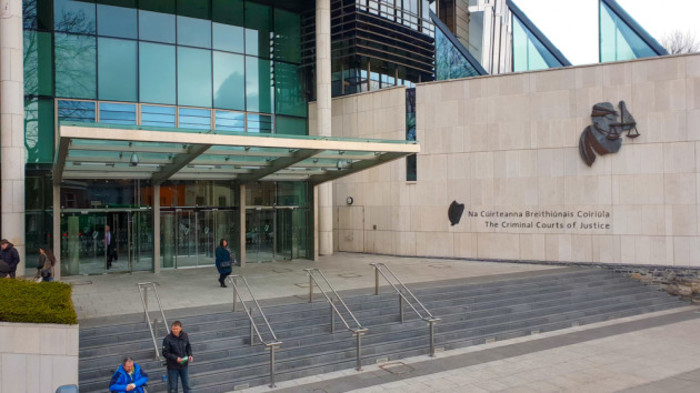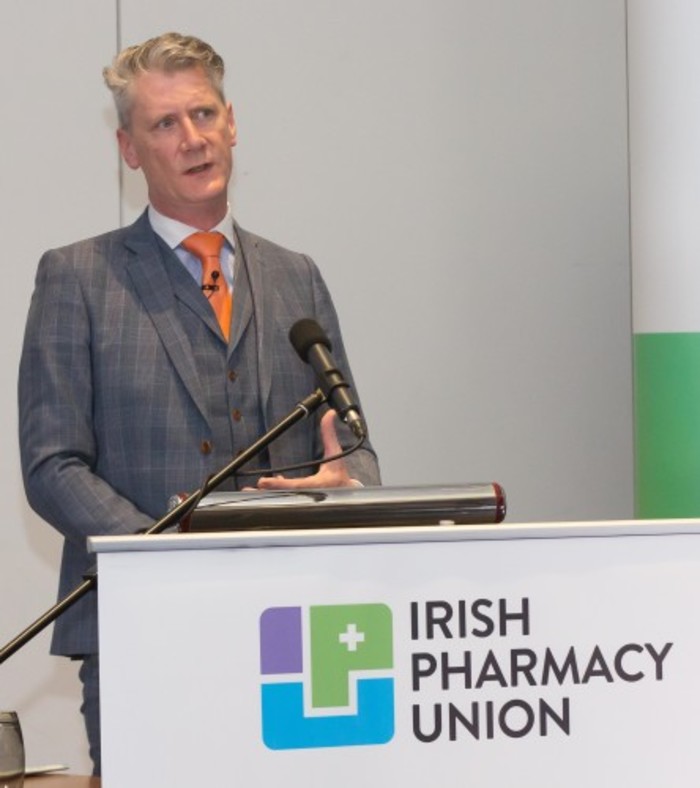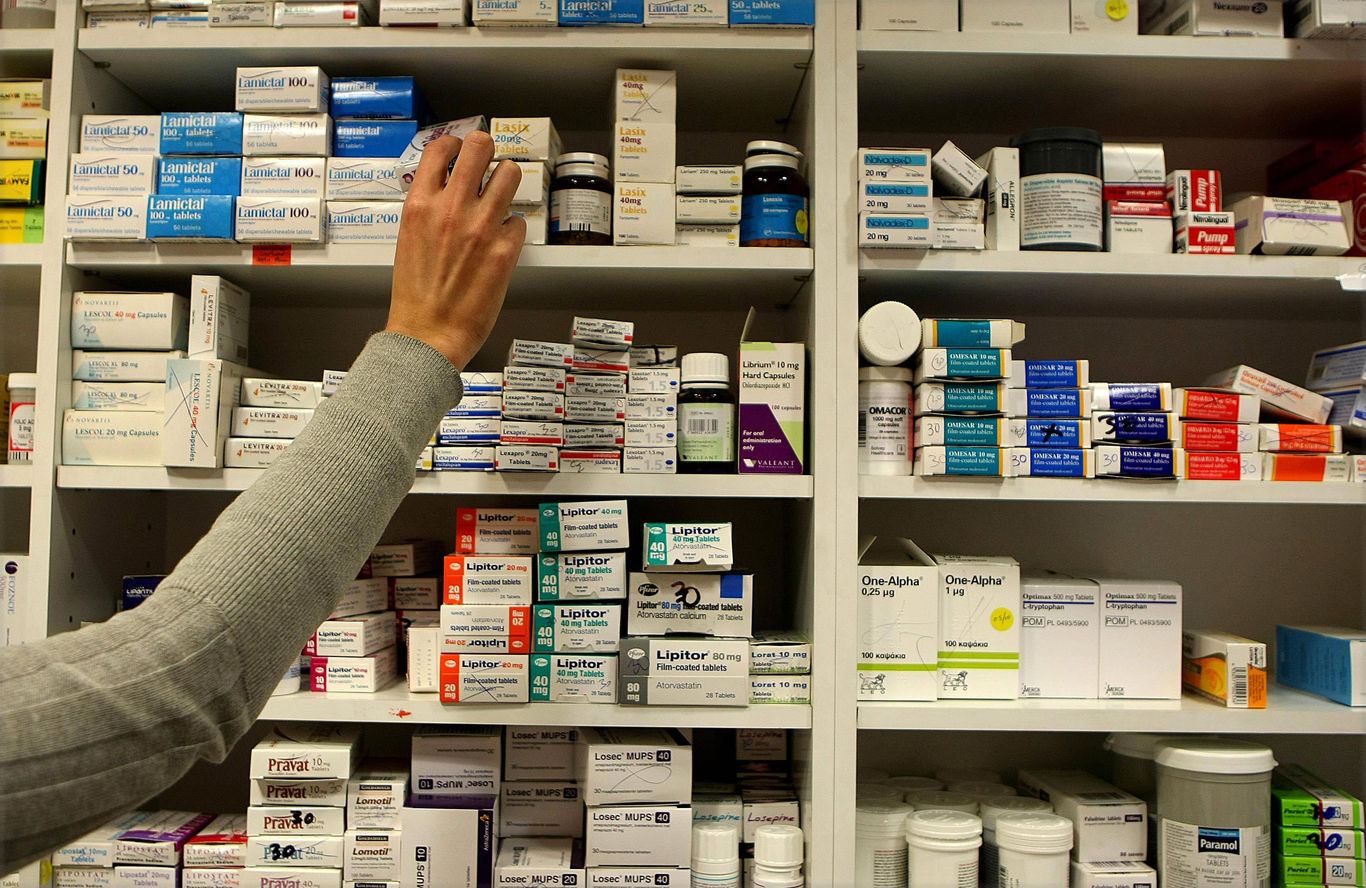'He had a syringe full of blood and put it to my neck': The front line of Irish pharmacies
Lobbyists say crimes against healthcare professionals have been getting worse in recent years.
THREE YEARS AGO, on a busy Saturday morning, Terenure pharmacist Anne Marie Horan had a knife put to her neck by a burglar.
The man’s accomplice produced a gun and the pair demanded that Horan hand over cash from the shop till and various drugs including Valium.
A few moments before the raid, Horan’s husband and two children – aged six and eight at the time – had come into the shop to say hello. They witnessed the entire attack.
“My children weren’t threatened. But they saw me being threatened and asked my husband, ‘Is that man going to hurt mummy?’ They could remember the knife and the gun,” Horan tells Fora.
The man with the gun had asked Horan’s husband to get the drugs, but he didn’t know where they were – a drug dispensary is alien to people outside the pharmacy profession. Horan suggests that’s why such raids occur during daylight hours.
There were four or five customers in the shop at the time, some of whom escaped and alerted the gardaí.
During the attack, Horan managed to press a panic button installed in the shop, which prompted the men to run outside, where a third individual was waiting in a getaway car.
“In my mind I thought, ‘I have to press the panic button or they’re going to be here forever.’ It’s only a few minutes, but it seems like forever.”
Horan suspects the attackers – who were never caught – were drug addicts and were more concerned about what was in the dispensary than what was in the till.
“The two men were shaking, which makes the whole thing much more dangerous. They were not really in control of themselves.”
She says they dropped a wad of cash as they were leaving and the drugs they stole had no real monetary value.
“People shoplifting perfume would get more. It wasn’t a financial thing.”
This wasn’t the first violent robbery Horan experienced. She estimates that in the two decades she has worked in the industry, she has been subjected to 10 or 12 incidents that went beyond the usual retail crimes like shoplifting.
Several years ago, another burglar threatened Horan with a knife. At the end or the ordeal, the man – who wore a balaclava – shook hands with the witnesses in the pharmacy.
“When he was leaving, he shook all of our hands so we’d tell the police that he hadn’t hurt us. He was someone who was in and out of the system and didn’t want to get charged with aggravated assault.”
 Criminal Courts of Justice, Dublin
Criminal Courts of Justice, Dublin
The Irish Pharmacy Union (IPU), which represents more than 2,000 community pharmacists, has for a number of years lobbied lawmakers on the issue of violent crime against its members.
A survey of 130 members found that one in five pharmacies were victims of shoplifting, raids or break-ins last year, with one-third of incidents involving a weapon.
IPU president and third-generation pharmacist Daragh Connolly appeared before the joint Oireachtas committee on business, enterprise and innovation last week to highlight the problem.
Speaking to Fora, Connolly – who has also been the victim of assault – says the criminal justice system in its current form is flawed.
“There’s a disrespect and breakdown in the rule of law. We are seeing more than anecdotal evidence of people who are career criminals,” he says.
“People who are prepared to commit these crimes, using the threat of physical force, seem to have little fear of the law and seem to have a huge knowledge of the system.”
Connolly says the burden of proof is very high for businesses that are attacked. He says one time he was spat at, punched and kicked by thieves and advised by gardaí to produce three hours of CCTV footage.
“They said if this goes to court, the solicitors may wish to say that I said something to offend that person, and that’s why they attacked me.
“As a pharmacist for 20 years, I have to be under this suspicion that somebody stealing who decided to spit at me, that it might have been my fault.”
Dilemma
The IPU has called for a number of measures to be introduced to mitigate against crime, including tougher sentencing.
Connolly says the organisation is by no means suggesting that people should be locked up forever, but thinks that individuals with multiple charges and previous convictions shouldn’t be given single, concurrent sentences.
“The majority are repeat offenders. This is how they make ends meet and they’re known in their local communities … I think they should be held to account and questioned why they’re in front of a judge for the 20th time.”
 Daragh Connolly, IPU
Daragh Connolly, IPU
Connolly notes that the problem with crimes against pharmacies often reflects socio-economic problems in an area.
“We know that pharmacies that are struggling the most are in deprived, isolated and rural areas.”
This creates a dilemma for pharmacists, Connolly says, whose job it is to provide healthcare and discretion to people, some of whom live chaotic lives and have drug dependencies.
“Underlying all of this is the service that we provide to patients who need healthcare. If it’s a case that we have to put buzzers on doors, if we have to start working behind bullet proof glass … it’s stopping us being that available healthcare professional and not making assumptions about people.”
Elaine Clarke – who opened a business in Rathdowney, Co Laois this week – found herself at the centre of this dilemma when she was a pharmacy student working in Dublin.
A number of years ago, Clarke, a fellow pharmacist and an elderly customer were held up by a man wearing a sheet over his face.
“I was possibly the weakest target. He was quite calm. He had a syringe full of blood and said he had AIDS. He grabbed me by my shoulders and put it to my neck,” she says.
“When I was in it I totally froze. I couldn’t move. I went as white as a ghost. I remember the pharmacist had to physically move me behind the counter.”
The culprit managed to steal drugs and cash, but was later apprehended by gardaí in a nearby housing estate. When he was charged, he was given a seven-year sentence.
“I feel bad for him in one respect. He was dealing with an addiction. That in itself needs help,” Clarke says, adding that crime against pharmacists is in direct conflict with the “caring side” of the profession.

Clarke says she had to invest in high-definition CCTV, several panic alarm buttons and staff training ahead of opening her own shop in Laois.
She has also taken self-defence classes and crisis-situation training after the syringe incident.
“It didn’t put me off. I would be reluctant to let it have that kind of affect on me,” she says.
Illicit drugs policy
To deal with the issue of crime, the IPU offers crime-prevention workshops in conjunction with An Garda Siochána.
It also operates a private and confidential counselling hotline for pharmacists with post traumatic stress disorder, for which Daragh Connolly says there is a increasing need.
As well as calling for tougher sentencing, the union has suggested an increase in garda patrols, increased public CCTV and more business watch initiatives to deal with the issue.
Members of the union passed a motion at its 2017 AGM advocating the decriminalisation of illicit drugs, which Connolly suggests might alleviate some of the wider societal issues associated with crime against pharmacists.
“We help people who have problems around drugs because we’re experts around drugs.
“What we’re seeing is this revolving door of people getting involved in illicit drug taking, getting arrested, being in front of a judge and automatically going into a criminal justice system that labels them a criminal,” he says.
The IPU is in favour of Portugal’s drugs policy, where illicit drugs were decriminalised in 2001.
“(In Portugal) people aren’t automatically told it’s fine to take illicit, street drugs. They’re actually sat down and questioned about their behaviour with a panel. They’re made to address their behaviour,” Connolly says.
“That isn’t through the criminal justice system, they’re directed through a healthcare system. This is what we would advocate … We need to treat people at a healthcare level.”






